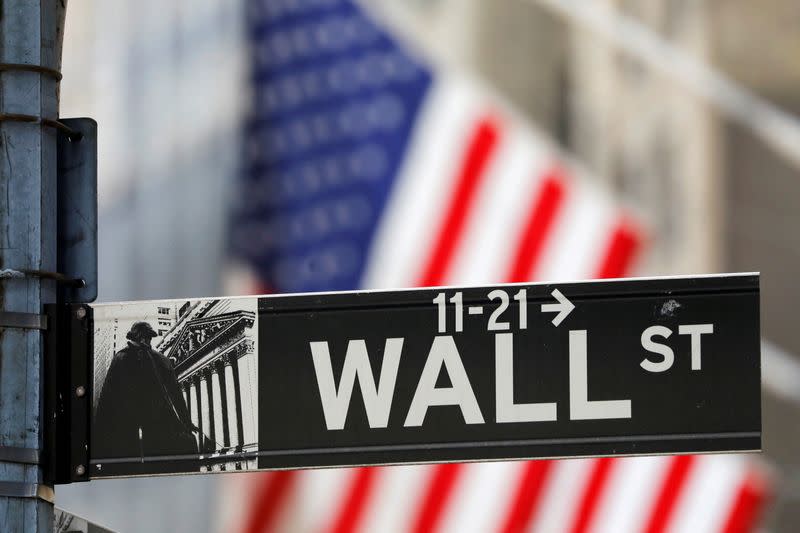Wall Street muted as traders eye inflation data

By Lawrence Delevingne and Nell Mackenzie
(Reuters) -Wall Street stocks rose slightly on Monday, while oil prices and the dollar dipped, as investors digested Chinese economic data and looked ahead to a key U.S. inflation report and corporate earnings.
U.S. stocks gained modestly. The Dow Jones Industrial Average rose 0.62%, the S&P 500 gained 0.24%, and the Nasdaq Composite added 0.18%. European shares inched higher on Monday with the travel and leisure sector leading gains. The pan-European STOXX 600 index finished up 0.18%.
Chinese consumer price figures fell in June, leaving them almost unchanged from a year earlier, while producer prices slid deeper into negative territory.
The weakness implies scope for further monetary policy easing, but also underlines the challenge China faces in reflating its economy and avoiding a deflationary spiral.
"China is just a symptom. We see weaker growth around the world because of the effect of higher interest rates," said Matthias Scheiber, global head of multi-asset portfolio management at Allspring Global Investments in London.
Citigroup on Monday downgraded U.S. stocks in anticipation of a pullback in growth equities and a recession in the fourth quarter of the year, while betting on beaten-down counterparts in Europe with an upgrade.
The brokerage cut its rating on U.S. stocks to "neutral" from "overweight" after a strong rally in the first half of the year. It warned that growth stocks were set for a pullback as the "euphoria" around artificial intelligence enters a more "digestive" phase.
The earnings season starts this week with JPMorgan, Citi, Wells Fargo, State Street and PepsiCo among those reporting.
CPI SLOWDOWN
U.S. consumer prices are expected on Wednesday to show headline inflation slowed to its lowest since early 2021 at 3.1%, down from 9.1% a year earlier.
Separately, U.S. wholesale inventories were unchanged in May after declining for two straight months, suggesting inventory investment could support economic growth in the second quarter.
"Markets are coming around to our view that central banks will be forced to keep policy tight to curb inflationary pressures," BlackRock Investment Institute strategists wrote in a note Monday. "Stubbornly high U.S. CPI inflation data this week could bolster the recent bond yield surge as markets expect the Fed to hike rates."
Markets still think the Federal Reserve is likely to hike rates this month, but a weak CPI might lessen the risk of a further move in September.
Currently futures imply around a 90% probability of a rise to 5.25%-5.5% this month, up 25 basis points.
The Fed will likely need to raise rates further to bring down inflation, but the end to its current monetary policy tightening cycle is getting close, several U.S. central bank officials said on Monday.
"I think we're close," said Michael Barr, Fed Vice Chair for Supervision.
Markets have also priced in higher rates in Europe and the UK. Canada's central bank meets this week and markets imply a 69% chance of another hike.
The risk of higher global rates for longer has caused havoc in bond markets, where U.S. 10-year yields jumped 23 basis points last week, German yields rose 24 basis points and UK yields leapt 26 basis points. The yield on 10-year U.S. notes fell 4 basis points on Monday to 4.008%.
U.S. two-year yields last stood at 4.870%, having hit a 16-year high of 5.12% last week.
The dollar sank to around a three-week low against the yen on Monday as investors continued to price in expectations that the Federal Reserve is near the end of its tightening cycle.
The dollar index dipped 0.3%, while the euro was up 0.3%, and the pound rose 0.16%.
In commodity markets, gold was little changed after making a slight gain last week. [GOL/]
Oil prices declined on Monday after weak economic data from top consumers the U.S. and China, although expected crude supply cuts from Saudi Arabia and Russia limited losses. [O/R]
U.S. crude fell 0.9% to $73.18 per barrel and Brent was at $77.86, down about 0.8% on the day.
(Reporting by Lawrence Delevingne in Boston and Nell Mackenzie in London; Editing by Mark Heinrich, David Evans, Will Dunham and Christina Fincher)

 Yahoo Finance
Yahoo Finance 